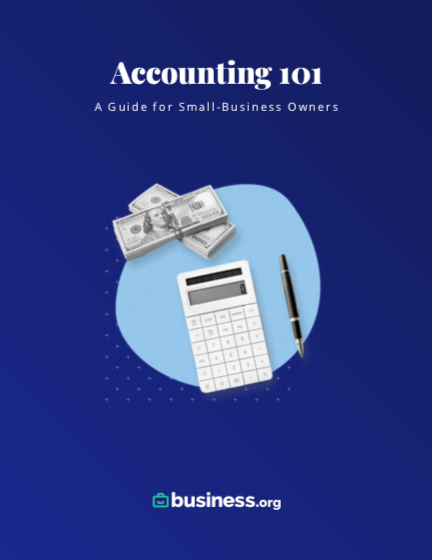We are committed to sharing unbiased reviews. Some of the links on our site are from our partners who compensate us. Read our editorial guidelines and advertising disclosure.
The Top 10 Bookkeeping Errors That Are Costing Your Business Money
Small-business owners often make bookkeeping mistakes in their early years of operation. This might be due to a lack of knowledge regarding proper accounting procedures. While you may not have the time, money, or desire to become a certified accountant, it is still possible to avoid a few key pitfalls that can impact your company’s bottom line.
The following are 10 of the most common bookkeeping mistakes made by small-business owners.
1. Trying to do it all yourself
While money management is certainly an important task, it’s not necessarily crucial for you to be the one to do it. In fact, if you don’t have a fairly strong background in accounting and business tax law, it’s probably advisable that you don’t handle your own bookkeeping. Delegating this task to a professional will help you find errors while freeing you up to work on your business.
2. Always going the cheapest route
While pinching pennies can certainly save your business money, there is a point where frugality can actually cost you money. In many cases, the adage “you get what you pay for” rings true. Spend a little extra to get a quality accountant rather than the cheapest bookkeeper available.
In addition, do your research before spending money on other business services and items that have a shelf life of more than a few months. When purchasing items like office furniture, equipment, or software, a good rule of thumb to follow is to select a moderately priced item and purchase it when it’s on sale.
3. Failing to negotiate vendor terms
Many small-business owners purchase items for their business from the same vendor month after month. If this is your practice, it’s a great idea to contact your vendor and build a personal relationship with them. Even if your purchases are relatively small, you can still call and ask questions. If you get to know your vendor personally, you might be able to negotiate reduced pricing or longer payment terms. This might mean increasing cash flow for your business.
4. Failing to track receipts for minor purchases
Even the most meticulous business owners occasionally forget to save a receipt related to a business purchase. While it might not seem like a big deal if a meal ticket is missing here or there, those small purchases can add up to big money. Likewise, you don’t want to have to answer to Uncle Sam if you claim expenses without the proof to back up every penny.
5. Writing off major purchases as immediate expenses
If you visit your local office supply store and pick up $250 worth of printer paper and other items that have to be replenished frequently, it’s perfectly acceptable to log the purchase under “office supplies” and write it off.
On the other hand, if you happen to pick up a new $250 printer, the purchase needs to be logged differently. It’s not the amount that matters, it’s the useful life of the items you purchased. A printer will definitely be used longer than a few months, so add it on the books as an asset and depreciate it over the estimated useful life of the item.
6. Claiming “charitable” tax deductions
For a personal tax return, individuals are allowed to write off donations given to charitable organizations. Businesses, however, are not afforded the same deduction. Because businesses are often given recognition, advertising space, or some other concession in return for their donations, they are not truly considered “charity.” If you make this bookkeeping mistake, the Internal Revenue Service will probably make sure you don’t do it twice.
By signing up I agree to the Terms of Use and Privacy Policy.
7. Failing to back up your data
While keeping hard copies of all your records is generally a thing of the past, don’t rely solely on cloud hosting to ensure your data is always accessible. Make sure your accountant or bookkeeper uses software with a fail-safe data backup system and consider keeping two or more digital copies of each record, one in the cloud and one safely and securely on your desktop or hard drive.
8. Failing to accurately report sales and payroll taxes
As previously mentioned, the IRS has little tolerance for error. If you misrepresent the amount of sales or payroll tax owed by your company, you can expect hefty fines. It’s best to leave this one to the professionals, and double- or triple-check your returns before dropping them in the mail.
9. Failing to review books yourself
While it’s a good idea to delegate your bookkeeping to an experienced professional, it isn’t necessarily a good idea to give them open access to business records without a system of checks and balances in place. Many small-business owners assign responsibility of the company books to a close family member or friend with accounting experience, only to find out several years later they’ve been scammed. Had they reviewed canceled checks or petty cash ledgers once a month, the issue could have been caught early on.
10. Not staying up to date
The initial years of a new business are extremely overwhelming, but failing to keep your books current will only make the situation worse. If your books are suffering because business is booming, that’s a sure sign you need to bring on an extra hand. Costly errors will be caught more quickly, and your business operations will be more efficient in general.
Compare the year's best accounting software
Data as of 3/9/23. Offers and availability may vary by location and are subject to change.
*Only available for businesses with an annual revenue beneath $50K USD
**Current offer: 90% off for 3 mos. or 30-day free trial
†Current offer: 50% off for three months or 30-day free trial
‡Current offer: 75% off for 3 mos. Available for new customers only
The takeaway
These costly bookkeeping mistakes can happen to anyone, and at least one of them will probably happen to you at some point in your business. Seek out information, prepare accordingly, and be on the lookout for warning signs. Your bottom line will thank you.
Not interested in hiring a CPA? The right software can make bookkeeping a little easier for the average layperson. Check out our top picks for the year’s best bookkeeping software.
Disclaimer
At Business.org, our research is meant to offer general product and service recommendations. We don't guarantee that our suggestions will work best for each individual or business, so consider your unique needs when choosing products and services.





